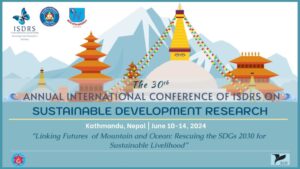Goals And Objectives
The Himalayan region is facing significant challenges related to sustainability due to climate change, rapid economic transformation, and escalating geopolitical tensions. Sustainability in the Himalayan region is a critical and complex issue due to its unique ecological, cultural, and geopolitical characteristics. Addressing sustainability in this region involves a multidimensional approach that considers environmental, social, and economic factors. The delicate balance between conservation and development must be maintained to ensure the long-term health and resilience of this ecologically sensitive and culturally rich region.
Contributions related to the following areas and fields are welcome:
- Addressing the unique challenges and opportunities in the Himalayan region.
- Exploring sustainable livelihood strategies specific to the Himalayan context.
- Promoting cross-sectoral collaborations and knowledge exchange for sustainable development in the Himalayas.
- Highlighting the interconnections between mountain and ocean ecosystems and their impact on sustainable livelihoods in the Himalayan region.
- Examining the role of the Himalayan region in achieving the SDGs by 2030.
- Identifying innovative solutions for sustainable livelihoods in the Himalayas.
Length And Content Of The Proposed Abstract To The Track
Each proposed abstract (in connection to one of the areas pointed out above) within 300 and 500 words (including everything)
- shall be best organized (without headlines) along usual structures (e.g., intro/method/findings or results/ discussion/conclusions)
- does not need to, but can include references
- shall provide in a final section
a. to which SDG(s) and SDG-target(s) their proposed abstract especially relate to (e.g. “SDG+Target: 14.1.”).
b. a brief indication of how the proposed contribution relates to the topic of the Conference (Linking Futures of Mountain and Ocean: Rescuing the SDGs 2030 for Sustainable Livelihood)
Abstracts that do not outline points 3.a.) AND 3.b.) might be considered less relevant in the Review.
Potential Publication Channels
With regard to potential publications, depending on the number and quality of contributions, diverse publication opportunities will be envisaged.
Submission
Keep up to date with developments of ISDRS 2024 Tracks here
“Linking Futures of Mountain and Ocean: Rescuing the SDGs 2030 for Sustainable Livelihood“
Who are we?
Sudeep Thakuri, Graduate School of Science and Technology, Mid-West University, Nepal.
sthakuri@hotmail.com
Dambaru Ballab Kattel, Institute of Tibetan Plateau Research, Chinese Academy of Sciences, China.
katteldb@itpcas.ac.cn
